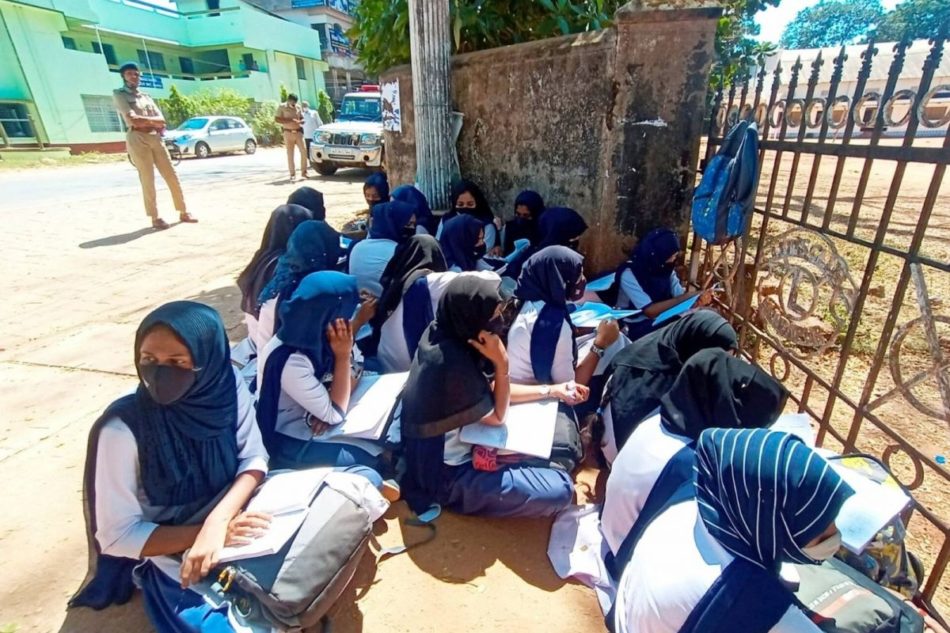After a few months of the hijab dispute, Indian leaders have returned with yet another attack on the Muslims, this time targeting our Prophet (PBUH). Muslims are now being humiliated by derogatory remarks about our beloved Prophet (PBUH) as if the numerous incidents of hijab ban and Hindutva sloganeering outside mosques weren’t enough.
The Bharatiya Janata Party (BJP) spokeswoman Nupur Sharma disrespected the Prophet during a TV discussion, setting up a storm of domestic outrage. Similarly, Naveen Kumar Jindal, the party’s Delhi media director, tweeted another derogatory statement against prophet Muhammad.
Notably, the media-savvy social Modi, renowned for promoting pluralistic principles overseas, has kept silent throughout this ordeal as Indian democracy has fallen into hatred and is humiliated by the global response. As a result, Muslims in this Indian country are forced to wonder if there is still a place for them to practice their faith openly after a representative that made such heinous remarks for the ruling party at the time.
Almost no significant political party or prominent political figure has felt the need to denounce such frequent public manifestations of anti-Muslim bigotry.
Instead, leaders of the BJP display their contempt for Muslims in India and their religion. This anti-Islamic hatred flows not only from their words but also from their body language and facial expression.
When BJP officials reference Muslims or Islam, insulting language is frequently used, suggesting that those who use it can act with impunity. They do not only target Muslims in India. Their hatred is directed against Islam and has more severe repercussions for the Muslim- or Islamic-dominated nations where many Indians, particularly Hindu Indians, work.
Moreover, the actions of two prominent BJP leaders cannot be viewed in isolation. Both have constantly criticized and mocked Islam, the Prophet, and Islamic customs. Additionally, in the capital of India, there have been several news conferences and gatherings where outright appeals for war against Islam have been made.
Furthermore, leaders and activists in the Hindutva movement frequently make vile comments regarding the Prophet’s life. These incidents have never been random or isolated occurrences. They are now almost an everyday occurrence.
The comments were also condemned by the International Union of Muslim Scholars (IUMS) and the Organization of Islamic Cooperation (OIC). The OIC pointed to “systematic practices against Muslims and restrictions on them”, such as numerous bans against headscarves in educational institutions, the destruction of Muslim property, and an increase in violence against Muslims, and noted that the remarks came amid an escalation of hatred and abuse of Islam in India.
Amnesty International and Human Rights Watch have criticized Modi for supporting anti-Muslim hate speech. After a prominent Muslim imam called for boycotts, Indian products were quickly removed from stores across the Muslim countries. Hashtags criticizing Prime Minister Narendra Modi started to gain traction on social media.
Significantly, when Modi pushes for a bigger position on the international stage, the controversy underlines one of the difficulties facing Indian foreign policy. Even though his government has developed close diplomatic ties with numerous Muslim countries, his party is facing increasing criticism for how it has treated India’s Muslim minority.
Due to its mistreatment of more than 200 million Muslims, India has been on genocide watch for some time. Muslims have been discriminated against since the Hindu nationalist Bharatiya Janata Party came to power in 2014. Examples include depriving native-born Muslims of their citizenship, occupying Kashmir illegally, and being sparked by factually incorrect rumors that Muslims were killing cows.
Additionally, before Modi assumed the presidency in 2014, most citizens believed their main issues were poverty, insufficient economic growth, and corruption. He rode to power on the promise of repairing everything. However, as the economy has deteriorated and unemployment and poverty have increased under his rule, the BJP has increasingly relied on supremacist tactics to distract attention and avoid accountability. It keeps pitting Hindu voters against Muslims and running increasingly ridiculous anti-Muslim campaigns.
Religious tensions in India have risen recently, with opponents accusing Indian television anchors of inciting them during heated discussions. #BoycottIndiaProducts and #StopIinsulting Prophet Muhammad trended on Twitter and Facebook in different countries. It is critical that all Muslims and anyone who believes in religious freedom let the world turn its back on Indian Muslims once more. Unless the Muslim world intervenes, Modi’s repression of Muslims will worsen. Moreover, a boycott would be a further problem for Modi, who has spent years strengthening connections with Middle Eastern nations to attract investments and establish markets for Indian commodities, clothes, and manufacturing.
The viewpoints of the BJP are, in reality, the language of the ruling party and state, which is broadcast each night on the top news networks in the nation. Therefore, to hold BJP officials accountable for insulting the Holy Prophet’s dignity, firm and observable action must be taken against them.
This attack on our Holy Prophet PBUH is the most hurtful thing anyone can do to Muslims who feel deep love and devotion for their Holy Prophet PBUH. OIC must take firm action against India because, tragically, so far, India has been able to get away with its Islamophobic policies.
*The writer is a researcher and analyst.
June 28, 2022
The viewpoints expressed by the authors do not necessarily reflect the opinions, viewpoints and editorial policies of Aequitas Review.


